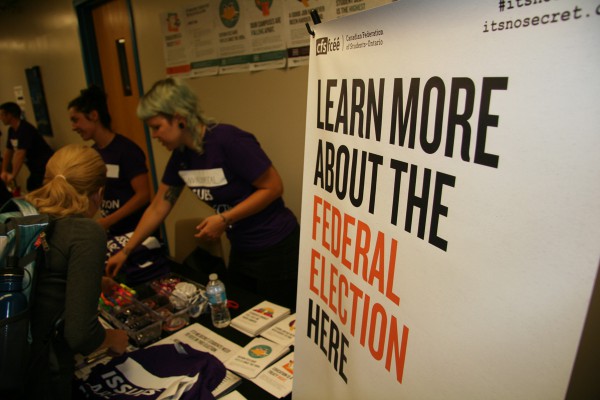Community Action Centre organizes elections campaign

CAC representatives engage students at the Mobilize The Vote talk. Photo: Steve Cornwell / The Dialog
The Fair Elections Act, or Bill C-23, puts up barriers to students voting in the upcoming federal election on Oct. 19, says staff at George Brown’s Community Action Centre (CAC). The Act, which changes ID requirements for Canadians wishing to vote “makes voting more complicated, and a lot of students have so much going on in their lives already,” said Steff Pinch, assistant at the CAC.
“It becomes confusing and a lot of students just can’t have that on their plate. So they end up not voting.”
Voter registration cards, which are mailed out in the weeks before an election, will no longer be accepted as proof of address. Additional ID, such as a driver’s license, is now required to prove a voter’s address, according to Elections Canada’s new guidelines.
Pinch pointed out that students are more likely to change addresses often, making the additional proof of address requirements difficult to meet. “What this means is that a lot of students are scrambling, trying to find a piece of ID that they can use as proof of address.”
Requirements around vouching at the polls have also become more stringent. Previously, vouching allowed a resident of one polling division to make a statement verifying that other people were also residents in the division. Pinch explained that students could use this option to verify that their roommates shared their address.
For this election, voters can still swear an oath to verify another voter’s address, but are limited to swearing on behalf of one other person. “It’s completely unfair for students,” said Pinch.
The CAC is running a campaign to raise awareness of the changes to ID requirements and mobilize students to vote this election.
“(Politicians) are underestimating us,” Pinch said, “and it’s a huge mistake.”
Because students traditionally have voted less than other demographics, Pinch said that Canadian politicians don’t think they have to incorporate student issues into their campaigns. The CAC campaign aims to shake up that view.
The CAC has organized several events, including panel discussions, art installations, and an Oct. 7 “Vote Mob” mass voting day, where students were bussed from George Brown campuses to the advance polls at Ryerson University.
For the vote mob event, CAC offered coffee and snacks for voters and chartered a school bus for voting students. CAC members also accompanied student voters to the Ryerson poll on the TTC.
“Even though there’s a lot of red tape this election, it’s really important for students to get out to vote. Students can change the outcome of this election,” Pinch urged.
The Canadian Federation of Students, along with the Council of Canadians, have launched an ongoing court challenge related to the Fair Elections Act. The groups argue that it violates sections of the Charter that guarantee the rights of all Canadian citizens to equal treatment before the law and to vote in federal elections.
While the challenge will not be heard until after the polls close on Oct. 19, if successful, it could still invalidate the results of the election.
According to Pinch, “there is a definite case against it. It’s definitely making it harder for youth, for students, for folks who are marginalized to actually access voting.”

